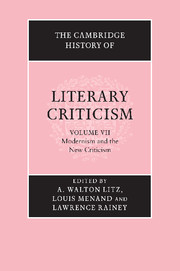1 - T. S. Eliot
from THE MODERNISTS
Published online by Cambridge University Press: 28 March 2008
Summary
T. S. Eliot became a figure in the tradition he made himself famous by attacking. He was a critic of modern society and modern culture who ended up an icon with in the institution that is one of modernity's moments, the twentieth-century university. This is a fate that may have disappointed him, but it would probably not have surprised him. His sense of historical perversity was pretty complete.
Eliot was a modern partly by temperament. He made a show, in his criticism, of depreciating writers to whom he owed a good deal of his voice as a poet and his principles as a critic. But he was a modern by circumstance, as well. For he could hardly have hoped to make himself the exception to the conditions he analysed with such mordant disapproval. When he criticised modern culture for its lack of a coherent moral ground, and for the idiosyncratic and makeshift value systems it produced to compensate for that lack, he did so in the name of doctrines – ‘royalism’, to take a notorious example – whose idiosyncracy is, to say the least, fairly pronounced. Eliot built his castle out of the stones he found lying around the yard of modernity, just as Wordsworth, Emerson, Arnold, and Pater had built theirs.
Most people are accustomed to drawing a distinction between modern art and literature on the one hand and modern life – the political, social, and economic conditions of modernity – on the other. They think of the first as the antagonist of the second: modern life runs along its track of disenchantment and demystification, and modern art and literature assess the damage.
- Type
- Chapter
- Information
- The Cambridge History of Literary Criticism , pp. 15 - 56Publisher: Cambridge University PressPrint publication year: 2000
References
- 3
- Cited by

